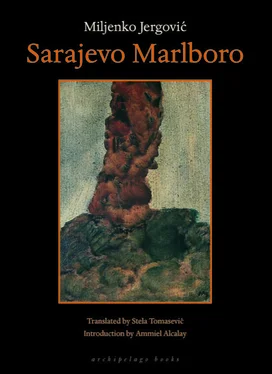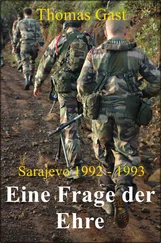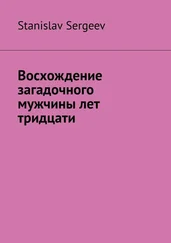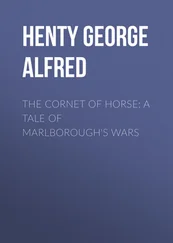The officers smiled at Izet, almost out of a sense of camaraderie, but they didn’t press him anymore about the troop formations. Instead they began a friendly conversation about other things. Izet talked knowingly about the political situation, though he was careful not to say anything to annoy his inquisitors or to give them any reason to suspect that he was trying to suck up to the enemy, or that he wasn’t in fact a colonel who was prepared to give up his life in order to safeguard military secrets. Izet played with words and swayed like a pelican on a wire. He talked nonsense but it sounded ambiguous and therefore wise. You utter a word, you weave it backwards and forwards, and at the end of the sentence you stand it on its head. You’re not making any sense, but you’re the only one who knows that.
The next day a colonel came into his room and announced that Izet was going to be released in exchange for ten Serb prisoners of war. Everything was agreed with the Croats, who wanted to know the identity of the war hero held by the Serbs. It was just a formality. The other side had to guard against swapping ten Chetniks for a nobody who was merely lying about being a colonel in the Green Berets.
Izet panicked. If he didn’t come up with a meaningful lie to tell his own people, the Chetniks would take great pleasure in slitting his throat, whether he confessed to stringing along the interrogators or continued to protest his high military rank. Hundreds of stories flashed through his head in a moment but each was as unconvincing and as complicated as the next.
At last he blurted out, “Tell them that you have captured the Condor from Treskavica.”
The Serb colonel looked at him blankly, then took a pen and paper, wrote it down and went out. That night was the longest in the whole of Izet’s life. All he wanted was to die without suffering, to fade away or disappear, so that he wouldn’t have to face the morning and the knife of his neighbor Spasoje.
At dawn three privates came to get him. One of them said, “Condor, it’s time!”
Izet left the army camp at Lukavica with a heavy heart. His knees were trembling. Outside, the door of a yellow Golf was open, and as Izet huddled in the back seat, he realized that he’d lost his voice again. Only this time nobody was asking any questions. Instead of taking him all the way to Spasoje, they just drove him to the bridge, where he was released. Halfway across the bridge he passed a group of men whose lives had been exchanged for his own.
As soon as Izet came clean and admitted that he wasn’t the Condor of Mount Treskavica, he was given a violent beating by his own people. The soldiers kept him locked up for days and threatened to shoot him or to give him back to the Chetniks. With each blow of the rifle-butt they shouted out the names of all the prisoners whose freedom would have been negotiable in exchange for the ten Serbs. They could have liberated war heroes instead of ending up with a sad case like Izet, who was only good at talking nonsense. In the end they let him go — fuck it! — it was their own fault for watching too many films and believing in stories about condors.
Sooner or later Izet recovered from the shock. He forgot about his episode in prison and went back to telling safer and more intelligent stories.
Having recovered from his wounds and his nightmares, the only painful memory that stayed with Izet concerned Mijo, the butcher, whose throat was slit by the Chetniks in Vraca. He couldn’t help wondering if Mijo had been killed for spouting the lie that Izet invented for him, or if the poor man had simply lacked the ability to use the right words at the right time. Perhaps there really are occasions in life when it’s best not to say anything.
People can be pathetic when they’re dying. Sometimes they try to make you feel guilty. Jan Palach doused himself in gasoline and then lit the touchpaper. Take the eighty-year-old guy who can’t bear to stop breathing. He’s having a tube inserted in his throat while his relatives sit in the waiting-room whining. Hospitals are full of people who grab hold of their souls. They fight over them like women fighting over bread in a bakery line while the mortars fall outside. In the end, of course, some playboy living a dolce vita announces that suicide is the only real philosophical question.
We were coming home with our water when the shells began to fall, so we ran into the nearest building. The hall was already full of people. Ivanka leaned against the wall and put her canisters down, but I didn’t let go of mine. She lit a cigarette, and then the place just exploded. People fell to the ground, and then one by one they stood up again. All except Ivanka, that is — she didn’t get up. At first, because there was no trace of blood, I thought she’d simply fainted out of fear. I lifted her head but it didn’t feel right; it was as though her neck was made of rubber. Her hair was covered in dust from the ceiling. I cleaned it off with my fingers. The emergency doctors rushed up in white coats and a boy with a face like Kafka’s tried to find the pulse on her neck. He was slow and methodical, as if he was playing the piano. I saw his fingers dance on Ivanka’s neck — it made me angry. I just wanted him to stop, but there were lots of people around, so I didn’t say anything. I think I was jealous. They put her on a stretcher and carried her away. Nobody spoke to me all the time I was there.
The crowd began to disperse. I was left on my own between the four canisters. I picked up the two I had been carrying. Water was pouring out of them, like the stream of water from those statues of little boys in Dubrovnik. Her canisters were still intact, so I picked them up and went outside. It was a beautiful spring day and by now the sound of gunfire had vanished. I covered the thirty yards or so to our building, and then decided to go for a walk, so I turned back and went in the opposite direction. Two soldiers were running along the bank. Some boys were playing kickball on the grass by the art school. One of them kicked the ball awkwardly — and I caught it on the volley. To be honest, if I hadn’t, I think it would have ended up in the Miljacka river. I met Tadija by the Two Fishermen Café. He asked me where I’d been exactly when the shelling began. I was afraid that he’d ask me about Ivanka. We sat down on the wall in front of the restaurant and he cut a cigarette in two with his penknife. (He took the half with no filter.) Wittgenstein was afraid of going mad, I told him, and that’s why he became a philosopher. I don’t remember what he’d wanted to be in the first place — a gardener or something. Tadija shrugged his shoulders and exhaled the smoke. A cold sore was visible on his mouth, next to the cigarette.
Ivanka’s funeral was brief and rather superficial. When it was over I went to the market and found seeds for carrots, parsnips and lettuce among the old shoes and the ludicrously expensive tins of beef. I bought a few packets and went home along the back streets in order to avoid meeting people I knew. The washing Ivanka had done a couple of days earlier still wasn’t dry. I buried my head in a damp, white shirt. It’s odd — even when the sun shines nothing dries. I cooled my face and pondered: Heraclitus only cracked jokes at his own expense, but Zeno made jokes against the world. Plato was a transvestite who dressed up humanity. Somebody should have bumped off Socrates to stop him making such a performance of his death. If you want my opinion, philosophy is just a video game. I put the shirt back on the line. My face hadn’t left any marks on the fabric.
I haven’t spoken to the girls for months and I don’t know how to break the news that their mother’s dead. But it’s wrong to let them go on thinking she’s still alive, a beloved parent to whom they need to send food parcels and remember in prayers at bedtime. They have a right to know so that they can mourn — and then forget. One life and one worry less.
Читать дальше










